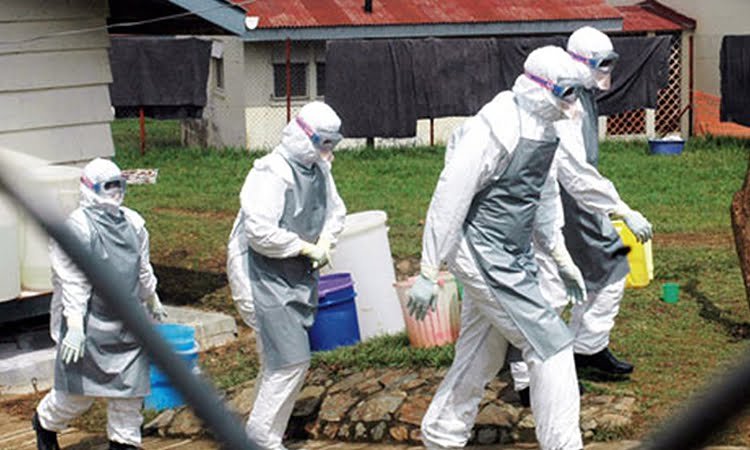
Jinja, Uganda | By Michael Wandati | Jinja district in the Eastern Region of Uganda has recorded its first Ebola fatality, becoming the ninth district in Uganda to register the Ebola Virus Disease (EVD).
This was after samples from Dan Waiswa who died on Friday 11, November 2021 at Buwenge Health Center IV returned positive results. The districts with confirmed cases include; Bunyangabu (1 case), Jinja (1), Kagadi (1), Kampala (17), Kassanda (46), Kyegegwa (4), Masaka (1), Mubende (63) and Wakiso (3).
The 45-year-old Waiswa, a farmer and resident of Kayalwe B village, in the Buyengo town council was admitted at Buwenge health centre IV following his referral from a private clinic in Buwenge town council early last week.
He had earlier on been admitted to the clinic on suspicion that he had typhoid. He presented with fever, diarrhoea, abdominal pain, muscle pain, cough, difficulty in breathing, and swallowing, and sore throat.
A medical worker at Buwenge Health Centre IV, says that when the patient failed to improve, they decided to pick his samples for testing for Ebola since he had informed them that he was in close contact with another case with similar symptoms in Kampala city.

The samples were extracted from the patient on November 11, a few hours before he passed away. His body was handed over to his relatives for burial. However, a report issued by the Uganda Virus Research Institute (UVRI) on Saturday 12th night shows that Waiswa succumbed to Ebola.
Under the prevailing Standard Operating Procedures (SOPs), suspected and confirmed Ebola victims can only be buried by trained burial team personnel in a bid to minimise further spread.
Jinja deputy resident city commissioner, Mohammed Kigongo, says that Waiswa’s brother, a resident from an undisclosed area in Kampala succumbed to Ebola on November 3. He says that they have dispatched surveillance teams to pick samples from the deceased’s family members, health workers, and patients at the St. Catherine clinic and Guardian medical centre in Buwenge sub-county and town council respectively where the patient was first managed for peptic ulcers and typhoid.
Uganda’s Ebola risk situation upgraded to very high level
Meanwhile, the World Health Organization (WHO) has upgraded Uganda’s Ebola risk situation from ‘high’ to ‘very high’, and from ‘low’ to ‘high’ at the regional level since the virus was first detected in late September 2022. However, WHO determined the risk remained low at the global level.
The latest WHO figures put the number of confirmed and suspected cases of Ebola in Uganda at 158, including 54 confirmed deaths and 21 probable deaths. This brings the case fatality rate up to nearly 40 per cent. WHO reports three vaccine candidates have been identified that could be tested in randomized clinical trials in Uganda. No starting date has been set.

Janet Diaz, head of the WHO’s program for clinical management in health emergencies, recently returned from a week-long visit to Uganda to take stock of the current situation and assess the needs of health facilities in affected areas. Even without a proven Ebola vaccine, she said lives can be saved by providing optimal supportive care.
“This includes early diagnosis and monitoring of patients so health workers can give immediate care for dehydration with IV fluids,” she said. “They can correct glucose levels or electrolyte levels if they are low. They can ensure that patients get good nutrition, and that if they develop any co-infections, such as malaria that is treated appropriately.”
Read Also: Museveni assures Ugandans there will be no Ebola lockdown
Diaz cited community engagement as probably the most important. To stop the Ebola outbreak, she noted the community must believe, engage and be part of that response. She said concerted efforts are being made to get the community to seek care if they have symptoms and to follow through on contact tracing.
“And then if any symptom occurs that they report it right away so they can get tested and treated,” said Diaz. “I think if we can message around the treatment and safe care and good care in Ebola care facilities, then that we hope and that these facilities are inviting to patients and communities, that we would avoid any stigma or fear if someone gets diagnosed.”
Diaz said the WHO is helping Uganda’s ministry of Health to establish more bed capacity and is involved in building at least three new patient facilities. She says more than 80 WHO experts on the ground are mentoring clinical staff on best care. In addition, she says large-scale training is taking place on infection prevention and control.



